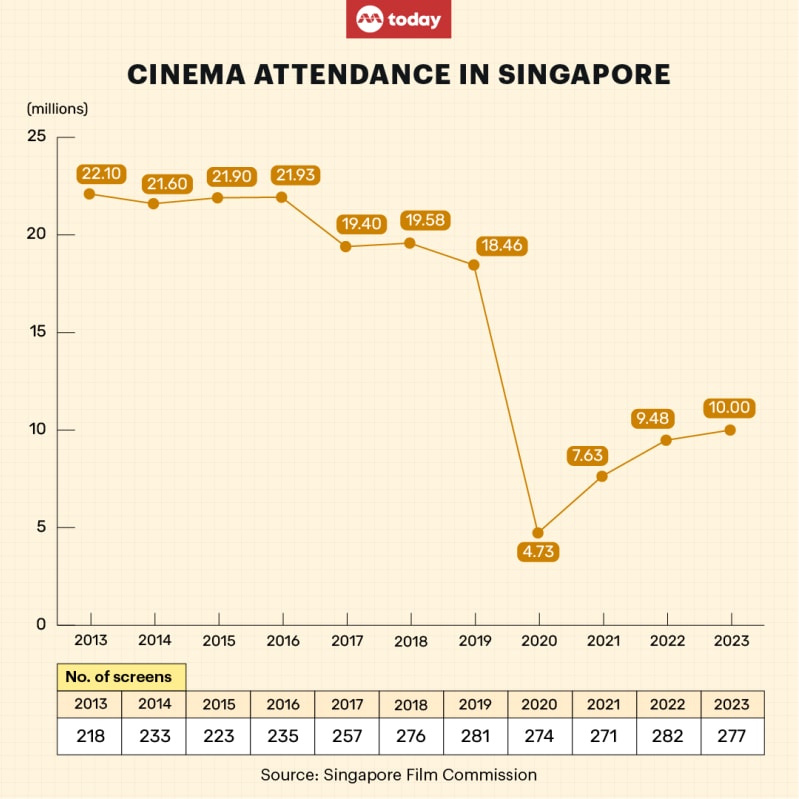Lights, camera, optimism: Moviegoers, observers believe cinemas can bounce back with some novel ideas

While other large scale events or viewings have returned to pre-Covid levels, cinema attendance has yet to recover. (Photo: iStock)
SINGAPORE — Popular streaming services such as Netflix, Amazon Prime and Viu are some of the most frequently opened mobile applications on movie enthusiast Kylie Goh’s smartphone.
Even though she uses these apps, the 28-year-old still goes to the cinema once every few weeks because "nothing can replace" the experience of watching a soul-stirring tearjerker on a large screen.
“It’s a little 'heart pain’ at first,” she said of the cost of the movie ticket, which comes up to about S$16. “But you quickly forget about that once the movie starts. It’s a luxurious experience, a ‘treat yourself’ type of thing.”
The media consultant may be willing to stomach the cost of heading to the cinema regularly, but there are others who appear to be less than enthusiastic about doing the same.
Like other activities that involved large groups, cinema attendance took a hit during the Covid-19 pandemic when people looked to avoid crowds.
After the pandemic, people were back to catching plays, musicals and concerts, while many more were travelling overseas, but cinema patrons did not return significantly.
Data from the Singapore Film Commission showed that cinemas amassed 10 million attendees across 277 screens last year — a far cry from the 18.46 million recorded pre-Covid in 2019.
At its peak, cinema attendance reached 22.1 million in both 2011 and 2013.

Recently, there has been online discussions about the future of cinemas here in Singapore following the closure of Cathay Cineplexes' theatres in AMK Hub this June.
Cathay Cineplexes, which is owned by entertainment firm mm2 Asia, closed three other theatres in the last two years, namely at Orchard Cineleisure, The Cathay and Parkway Parade malls.
Some cinemagoers were also perplexed at its decision not to screen the Deadpool & Wolverine blockbuster recently, sparking talk that the operator was on its last legs.
Analysts said that this decline in cinema patronage over the years can be attributed to the competition faced by cinema operators against streaming services and other forms of entertainment.
People have also formed new movie-watching habits during the pandemic — on smaller screens and in the comfort of their homes.
Is the cinema-going experience destined to fade into the night?
‘GLIMMERS OF HOPE’
In an informal straw poll by TODAY done on its Telegram account that received 3,520 responses, some 35 per cent of the respondents said that they could not remember the last time they were in a cinema.
Only 7 per cent said that they watched a movie in the cinema once a month, with the majority of respondents (38 per cent) indicating that they go to a cinema once every three to six months.
Adjunct lecturer Joe Escobedo from the National University of Singapore Business School said that these numbers may not seem impressive at first glance, but can still be considered an “optimistic indicator” for cinema operators.
“Although these numbers don't show a high frequency of visits, the fact that most people haven't completely abandoned theatres signals that there is still a substantial, albeit more sporadic, market for theatrical releases.”
Major Hollywood productions such as Barbie and Oppenheimer, analysts said, saw strong attendance from the audience here last year. Barbie grossed S$5.89 million and Oppenheimer, S$4.77 million.
However, they still cannot compare to 2022's top grossing movie Avatar: The Way of Water, which brought in $10.67 million.
Then, there was the Thai drama film How to Make Millions Before Grandma Dies.
Mr Michael Kam, senior lecturer at Ngee Ann Polytechnic’s School of Film and Media Studies, said that it is an example of a hit film that speaks of what effective marketing and promotion can do for the box office.
A range of blockbuster titles and indie films slated for screening next year such as the new Superman movie, Mission Impossible 8 and Avatar 3 are also expected to drive up box office sales, he added.
Dr Terri Tan, a lecturer at Republic Polytechnic’s School of Business, said that even though the data seems to suggest a somewhat steady, progressive recovery in terms of cinema patronage, it will probably take at least several more years before figures are comparable to those of pre-pandemic years.
WHAT CINEMAGOERS SAY
Most people interviewed by TODAY said that they still value the cinema-going experience because it is markedly different from watching a film on television or a mobile device.
Business analyst Calvin Ang, 28, said: “Hearing people laugh with you, gasp during a plot twist, or scream during a jump scare — that adds so much to the moment.”
However, most interviewees pointed out that there was the question of just how much they value that experience.
After all, the price of a monthly subscription to a streaming service, which offers access to hundreds of movies, can be less than or comparable to a single cinema ticket.
For Mr Jake Low, 29, the only reason he goes to a cinema three to four times a month with friends is because he uses a one-for-one weekend ticket promotion jointly offered by Shaw Theatres and recreational club Safra.
The assistant manager of brand and communications said that without that offer, it was unlikely that he would do so.
Agreeing, marketing executive Stacy Tan, 28, said that cinemas need to be more “experiential” with their offerings to keep things fresh.
“I don’t think people would mind paying slightly more for, let’s say, a park picnic experience or a drive-in theatre," she said.
“That’s not to say regular cinemas are passe, they just need to be more affordable when there just isn’t that much being offered."
Filmmaker Nishok, 29, who goes by one name, noted that plenty of people stay away from cinemas also because they know that certain films would end up on streaming services in several weeks.
Cinema operators, he said, should look at bringing in films that do not end up on such platforms.
“If a wider range of offerings were available alongside the tent-poles, it could help present the cinema as a place that provokes contemplation and reflection, as opposed to just being a place for blockbusters.”
HOW ARE CINEMAS EVOLVING?
Dr Tan of Republic Polytechnic said she is optimistic that physical cinemas will still hold a special place in society and are likely evolve to “accommodate a more diverse array of activities” rather than just screening movies.
She used the example of independent cinema operator The Projector, which through a host of “novel initiatives” such as short-film competitions and virtual quiz nights has remained “closely connected to its audience”.
During the launch of the Barbie movie last year, which Dr Tan attended, the venue was embellished with streamers, character portraits and a life-sized Barbie box photo booth. Attendees also took part in “best dressed” and “best Instagram post” competitions.
“In essence, there was food, fun, buzz, laughter and much discourse — a multi-faceted experience that transcended the actual movie-going itself,” Dr Tan said.
“If more cinemas can take a leaf out of this book and innovate their spaces in response to consumers’ varied experiential needs, I believe that the industry may, in time, witness its much-needed revival.”
Cinema operators agreed that that is the direction that they need to take and are looking for more novel ways to engage audiences and rejuvenate the experience.
The Projector's founder Karen Tan, for instance, told TODAY that it has "deliberately diversified its offerings over the years beyond just passive consumption of film", which include music gigs, live storytelling contests akin to poetry slams, art exhibitions and even animal adoption drives.
"We see ourselves as an inclusive platform and a home for alternative cultures and communities, which keeps our space interesting and vibrant."
Shaw Theatres, which runs eight cineplexes across the island, said it aimed to keep ticket prices as affordable as possible and pointed to experiences that it now provides patrons.
The operator has two cinemas in Balestier and Changi Airport's Jewel mall dedicated to families with small children, complete with bean bags, ball pits and toys.
The halls, dubbed Dreamers, cater to parents who would like to take their children to the movies without worrying about disturbing other patrons.
Shaw Theatres said that it has observed a growing demand for its premium experiences, including these child-friendly cinemas, and that these offerings "really took off" after the pandemic.
"Our premium halls are quick to fill during peak hours when the right content is available," it added.

Shaw Theatres previously held a festival and screened Aespa: World Tour, a concert movie by the K-pop girl group, which was sold out.
The operator did not give details on its upcoming promotions but said that there was still a "healthy appetite" for cinema shows and "bright spots" in the last year.
EagleWings Cinematics, an independent boutique cinema owned by EagleWings Group located at KAP Mall in Bukit Timah, said that ticket sales dropped by 64 per cent in 2020, but it has seen "consistent growth" in ticket sales since reopening in 2022.
Patrons watching movies are allowed to have Gong Cha bubble-tea drinks.
The company, which also runs a food business and yacht charter business, said that it has introduced new dining options at the mall this year as well as a new escape room, all to bring "fresh experiences" to shoppers before and after their trip to its cinema.
And Cathay, despite its recent closures, began operations at Century Square Mall in Tampines last year and presented its own attempt at a novel cinema. All of its six halls feature neon signs and reclined lounges in the form of wave-shaped seats.
Singapore's largest exhibitor Golden Village and WE Cinemas declined TODAY's requests to comment on the cinema business and their future plans.
Mr Melvin Ang, the executive chairman of mm2, told TODAY that he believes the cinema business will continue to pick up and eventually rise back to pre-Covid numbers due to "major global trends" of heavy investment.
Media giant Sony acquired the American cinema chain Alamo Drafthouse in June this year, and the National Association of Theatre Owners, an industry group that represents North America’s movie chains, announced a US$2.2 billion (S$2.8 million) renovation plan to improve the theatre experience.
In 2023, online film and gaming company China Ruyi, which is backed by Chinese internet giant Tencent, acquired Wanda Film, China’s largest exhibitor.
"These cases show that people and companies believe in the future of cinema," Mr Ang said.
He added: “What is universal is the very human need for communal entertainment; and movies are still the most accessible, most common and most popular form of social entertainment.
“People want to go to the movies. They want to get out of the house and be transported into the world that the filmmakers created.”








